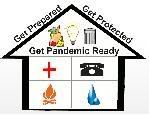Imagine If The Next Time Disaster Struck . ..
# 2311
On last Saturday afternoon, scant hours after Hurricane Ike struck the Texas gulf coast, residents were queuing up outside of Home Depot stores desperately hoping to get inside to buy batteries and generators.
Some were lucky enough to find flashlight batteries, but generators were sold out.
Many residents, twenty-four hours after the storm, were said to be without food or water. The angry mayor of Houston vowed to hold FEMA accountable.
FEMA, which is trying to rehabilitate its image after Katrina, once again found themselves the focus of a barrage of criticism when - 36 hours post-Ike - distribution PODS had not yet opened in Houston.
By Monday morning, 48 hours after the storm, PODs (Points of Distribution) were beginning to open in some areas, and some food distribution had begun.
Residents, however, were forced to stand in long lines and sometime wait hours. Many would return to homes without electricity, and would spend another night in the dark.
Residents carry boxes filled with Meals Ready to Eat (MRE) after picking them up from a Federal Emergency Management Agency (FEMA) point of distribution set up after Hurricane Ike knocked out power in Pasadena, Texas September 15, 2008. REUTERS/Jessica Rinaldi
It is a sad picture, and one that has been pretty much moved off the front page less than a week after the disaster, replaced by Wall Street worries and Presidential election news.
These people, particularly those displaced living in shelters - but almost everyone living in and around the Houston/Galveston/ Beaumont corridor - are living under miserable conditions right now.
My heart goes out to them. There but for the grace of the placement of a trough over the Midwest, go I. It could just as easily have been my section of the Gulf coast.
And next time, maybe it will be.
Now . . . imagine how much less stress and misery there would be right now in this region if . . . as has been strongly suggested by FEMA, the American Red Cross, and the Federal Government - every family had the recommended 2-weeks worth of food, water, and emergency supplies in their pantry.
Obviously, those who were displaced by the storm - forced to abandon their homes (and presumably their emergency supplies) - would have needed emergency relief within the first 24 hours of the storm.
But the rest of the population could easily have gone two or three days without clamoring for food and water. If they had prepared, they would already have had flashlights and lanterns, along with batteries for them. There would have been far less panic, far less misery and discomfort.
For the vast majority of people, there would have been no need to rush to the store before, or immediately after the storm.
Even if everyone had just provisioned for only 72-hours, that would have given relief agencies time to get their act in order, and supplies on the ground.
Ike came as no surprise.
Six days prior to landfall, the NHC (National Hurricane Center) was warning that the Texas/Louisiana coast was a prime target. Hurricane warnings went up along the Texas coast a full 72-hours before Ike struck.
No one should have been caught by surprise.
Frankly, how anyone could live on the gulf coast and not have 72-hours worth of food and water is beyond me.
The next disaster may not announce itself days in advance. We may not have time to prepare, or even to evacuate.
It could be an earthquake, or a forest fire, a tornado, or a flood. It could even be a pandemic.
If you are prepared - really prepared - you could not only take care of yourself and your family, you could extend some help to your friends and neighbors as well.
Another disaster will come. Today, tomorrow . . .next week.
But another disaster will happen.
We have a choice. We can choose to be victims, and accept our fate - or we can prepare, and be ready to meet the challenge of the next disaster.
Being prepared isn't rocket science. It doesn't even have to be expensive. A family of four could easily set up a 72-hour kit for the price of a couple of home-delivery pizzas.
Many agencies, of course, would like to see your family with 2-weeks or more of supplies. That can take a bit more doing.
To get you started, and to help guide you along the way, I can think of no better resource than GetPandemicReady.Org. I may be a little biased, as I made some modest contributions to this site.
Other resources I would recommend include:
FEMA http://www.fema.gov/index.shtm
READY.GOV http://www.ready.gov/
AMERICAN RED CROSS http://www.redcross.org/
HHS Flu Site http://www.pandemicflu.gov/
The choice is ours.
We can either elect to learn from history, or we can be condemned to repeat it.
Related Post:
Widget by [ Iptek-4u ]



